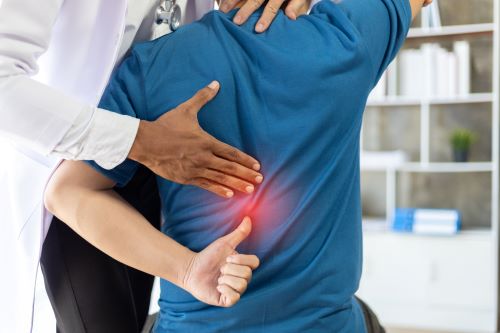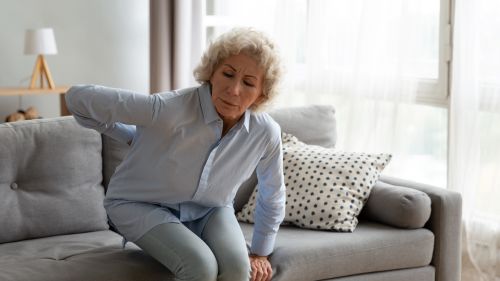Shoulder pain is a common aftermath of car accidents. The forces involved in a crash can be tremendous and shoulder pain after a car accident can range from mild to severe and debilitating and affect daily activities and overall life. Proper diagnosis and treatment at our Atlanta medical clinic is key to preventing long term complications like chronic pain or loss of mobility.
This guide will cover the different types of shoulder pain after a car accident and its causes, symptoms and treatment options.
Shoulder Injuries from Car Accidents
There are a multitude of shoulder injuries you can endure from a car accident:
Whiplash
Whiplash is a common injury in car accidents that affects the neck but often refers to the shoulder. The sudden jerking motion of the neck during a crash can strain the muscles and ligaments and cause pain in the shoulder area.
Torn Rotator Cuff
The rotator cuff, a group of muscles and tendons that surround the shoulder joint, can tear in high impact accidents. This can severely limit shoulder function and cause pain, weakness and reduced mobility.
Fractures
Fractures of the shoulder bones are serious and need immediate medical attention. Common fractures are:
- Clavicle: The collarbone is prone to fractures in a crash especially if the impact is to the upper body.
- Scapula: Less common but can occur in severe accidents and often with other injuries.
- Humerus: The upper arm bone (humerus) can fracture near the shoulder joint in high impact scenarios.
Dislocation
Shoulder dislocation occurs when the head of the humerus is forced out of the socket. This is often caused by a direct impact or a violent twisting motion in an accident. Dislocation can cause severe pain, swelling and visible deformity of the shoulder.
Soft Tissue Damage
Soft tissue injuries in the shoulder can be mild to severe depending on the accident. Common soft tissue injuries are:
- SLAP Tear: A specific type of labral tear, the SLAP tear is damage to the cartilage that surrounds the shoulder socket. This is often caused by sudden and forceful movements.
- Rotator Cuff Tears: Partial or full, these can cause varying degrees of pain and functional impairment.
- Separated Shoulder: A separated shoulder is damage to the ligaments that connect the collarbone to the shoulder blade, often from a fall or direct impact.
- Brachial Plexus Injury: This is damage to the network of nerves that control shoulder and arm movement. Can cause weakness, numbness or even paralysis in severe cases.
Frozen Shoulder (Adhesive Capsulitis)
Frozen shoulder is a condition that can occur after a shoulder injury where stiffness and pain gradually gets worse over time. This can severely limit the shoulder’s range of motion and requires long term treatment to regain function.
Labral Tear
The labrum is the cartilage that forms a cup for the shoulder joint. Tears in this cartilage, often caused by trauma or repetitive motion, can cause instability and persistent shoulder pain. May require surgery to repair.
Causes of Shoulder Pain
Shoulder pain can be from multiple causes:
High Impact Car Accidents
Shoulder pain after a car accident is a common cause, often from the force of the impact on the body. The shoulder is one of the most mobile joints in the body and is prone to injury in such events. The force of the impact can cause fractures, dislocations and soft tissue damage.
Sudden Trauma
Sudden trauma in a car accident, such as the sudden stop of the vehicle or a violent collision, can strain or injure the shoulder. The shoulder can absorb the shock of the impact and cause muscle strains, ligament sprains or more severe injuries like rotator cuff tears.
Direct Trauma
Direct trauma to the shoulder occurs when the shoulder hits another object in a car accident, such as the steering wheel, dashboard or door. This type of impact can cause fractures, dislocations and soft tissue injuries resulting in immediate and severe shoulder pain.
Muscle Strain or Sprain
Muscle strains and sprains are common in car accidents due to the sudden and forceful movements of the body. A strain occurs when the muscles or tendons are overstretched or torn, a sprain is when the ligaments that support the shoulder joint are stretched or torn. Both can cause significant pain and limit the shoulder’s range of motion.
Tissue Damage
Tissue damage in the shoulder can occur from tearing or stretching of soft tissues, including muscles, ligaments, tendons and cartilage. This may not be immediately apparent but can cause chronic pain and long term complications if left untreated. Tissue damage is often the underlying cause of conditions like rotator cuff tears, labral tears and SLAP tears.
Fractures or Dislocation of Shoulder Bones
Fractures and dislocations are severe injuries that occur when the bones of the shoulder are broken or forced out of their normal position. These are often caused by high impact forces or direct trauma in a car accident. Fractures can be of the clavicle, scapula or humerus, while dislocations are of the shoulder joint itself. Both require immediate medical attention to prevent further complications.
Symptoms of Shoulder Pain
You may experience some of these symptoms of shoulder pain after a car accident:
Limited Mobility and Range of Motion
One of the most obvious symptoms of shoulder pain after a car accident is limited range of motion. People may find it hard to lift, rotate or move the arm normally. This limitation often means there is structural damage or inflammation in the shoulder joint.
Pain or Discomfort When Lifting or Rotating the Arm
Pain or discomfort during specific movements like lifting or rotating the arm is a common symptom of shoulder injuries. This pain can range from a dull ache to a sharp stabbing sensation depending on the severity of the injury. It gets worse with activity and may get better with rest.
Weakness in the Arm or Shoulder
Weakness in the affected arm or shoulder is a big symptom that can mean a serious injury like a rotator cuff tear or nerve damage. This weakness can manifest as difficulty in doing everyday tasks like lifting objects or reaching overhead and can greatly impact one’s quality of life.
Instability or Cracking Sounds in the Shoulder Joint
Some people may feel instability or hear cracking or popping sounds (crepitus) in the shoulder joint. These symptoms mean potential structural problems in the shoulder like labral tear, dislocation or ligament damage and should be checked by a doctor.
Pain When Lying on the Injured Shoulder
Pain that gets worse when lying on the injured shoulder is a common complaint. This discomfort can make it hard to find a comfortable sleeping position and can disrupt sleep. The pain is often due to pressure on the injured area, aggravating inflammation or irritation.
Inflammation and Bruising
Visible signs of inflammation and bruising around the shoulder means trauma. Swelling can occur immediately after the injury and is accompanied by discoloration of the skin. These symptoms means underlying tissue damage or bleeding and often corresponds to the severity of the injury.
Numbness or Tingling in the Arm or Hand
Numbness or tingling in the arm or hand is an alarming symptom often associated with nerve involvement like brachial plexus injury. These sensations can be intermittent or constant and means significant nerve compression or damage and needs medical attention ASAP.
Can’t Sleep Due to Pain
Shoulder pain after a car accident can disrupt sleep. It’s a big symptom because it can create a cycle of discomfort and fatigue. Not being able to rest well due to pain can slow down the healing process and worsen other symptoms so it’s important to address the root cause of the pain.
Treatment for Shoulder Pain
Fortunately, there are many treatment options for shoulder pain after a car accident:
RICE Method
The RICE method—Rest, Ice, Compression, Elevation—is the basic approach to minor shoulder pain after a car accident. Resting the shoulder prevents further strain, ice reduces swelling and pain. Compression using bandages or wraps helps control swelling and elevation minimizes fluid accumulation. This is most effective when done immediately after the injury.
Physical Therapy
Physical therapy is important to regain mobility and strength in the shoulder after an injury. A structured rehabilitation program guided by a physical therapist includes exercises to improve range of motion, strengthen muscles and enhance joint stability. Consistent therapy can prevent stiffness and promote full recovery.
Medication
Pain management often involves the use of over-the-counter or prescription medications. Nonsteroidal anti-inflammatory drugs (NSAIDs) are used to reduce pain and inflammation. For severe pain, stronger prescription medications may be needed but should be used under medical supervision to avoid dependency.
Surgery
Surgical intervention is needed for severe shoulder injuries like rotator cuff tears, labral tears or major fractures. Surgical options are arthroscopic repair, open surgery or joint replacement depending on the nature and extent of the injury. Surgery is followed by a period of immobilization and physical therapy to ensure proper healing.
Imaging Tests
Imaging tests like X-rays, MRI and CT scans are needed to properly diagnose shoulder pain after a car accident. These tests provide detailed views of the bones, muscles and soft tissues to identify fractures, tears and other structural damage. Accurate diagnosis is important to determine the best treatment plan.
Re-evaluation
Follow up with a doctor or physical therapist to monitor progress and adjust treatment as needed. This will ensure the shoulder is healing well and any issues are addressed right away to avoid complications.
See Us at Our Atlanta Medical Clinic ASAP!
Dealing with shoulder paiu after a car accident can be debilitating, so you shouldn’t wait to seek treatment. Our talented medical experts at Georgia Spine and Orthopaedics are awaiting your call to help you find relief.
Schedule an appointment with us today at 678-929-4494!






